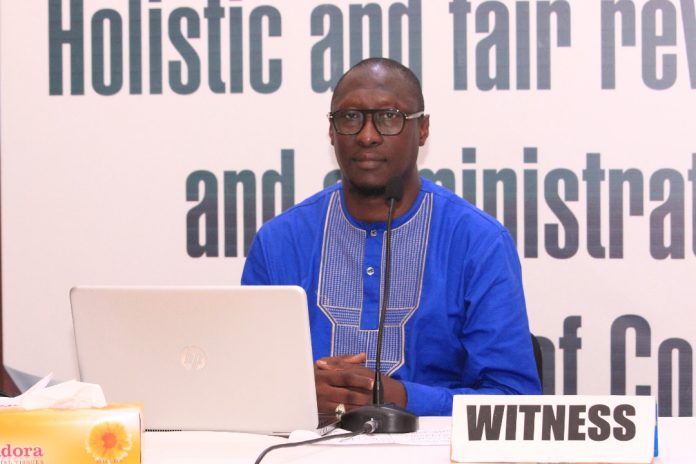By Yankuba Jallow
The Local Government Commission of Inquiry, tasked with investigating the financial and administrative conduct of local councils between 2018 and 2023, has heard damning testimony from Sandigi Njie, Administrative Manager at Banjul City Council (BCC), who accused top officials of engaging in deliberate acts of mismanagement.
Testifying before the Commission on July 17, 2025, Njie declared that the actions of Mayor Rohey Malick Lowe, former CEO Mustapha Batchilly, and other officers of the Council were not accidental or due to incompetence, but were intentional.
“These are people who have been cautioned, who were warned, who were advised, but they disregarded everything,” Njie stated. “Every act of this discrepancy, this siphoning of money… these are deliberate.”
Njie’s assertion came in the context of widespread irregularities in procurement, recruitment, and infrastructure project management at the Council, all of which he claimed were enabled by a culture of impunity and collusion.
During his testimony, Njie spoke extensively about a failed IT infrastructure project valued at D4.1 million. He explained that the contract was awarded to Micro Tech without due diligence, and the system delivered was non-functional. “We have the body of the network, but the brain is missing,” Njie said, referencing the Gamtel technical audit that highlighted severe flaws in the system.
Gamtel’s findings, admitted as evidence, revealed that basic components like operating systems and hard drives were missing from servers, and there was no proper cabling or security infrastructure in place. The Council, despite warnings, proceeded with the project.
“We told the CEO, ‘Please invite this contractor. Let him come to the office.’ He said, ‘Okay.’ But he never did,” Njie testified. “Had it been that wisdom was applied and Gamtel was engaged, Council would not have spent this kind of money.”
Njie also described his suspicion regarding payments allegedly made by the contractor, Lamin Gassama, to BCC staff. “He sent money to people’s accounts. People who are part of the contracts committee, part of the EU project team, and even the procurement officer,” he said.
He said the procurement officer, despite being tasked with delivering a letter summoning the contractor, never delivered it. “This was not negligence,” he said. “It was orchestrated.”
Turning to staffing, Njie recalled his objection to the appointment of Mam Laye Jassey as project coordinator for the EU-funded project, despite interview records showing that another candidate, Ebou Sowe, had performed better. According to him, the decision to appoint Jassey over the top-scoring candidate of the interview process undermined the Council’s hiring procedures.
“We advertised the project coordinator’s position for the EU project, and Ebou Sowe scored the highest mark,” Njie testified. “He was recommended, and everything was done.”
However, Njie said he was shocked to learn a few days later that Mam Laye Jassey had been appointed instead. “After a few days, I saw Mam Laye being appointed. So I couldn’t take it. I had to visit the CEO’s office,” he explained.
When he confronted then-CEO Mustapha Batchilly, the response, he said, was cryptic. “I said, ‘Sir, I thought we were recruiting based on merit.’ He said, ‘Young man, you don’t understand.’ I said, ‘Understand what?’ He said, ‘My hands are tied.’”
Njie later wrote a letter objecting to the decision but was told the appointment would stand. He noted that while he could not confirm the relationship, he had heard from sources that Jassey was related to the Mayor. “According to sources, I’m not confirming it,” he added.
Njie stressed that the irregular appointment demoraliseddemoralised staff and sent a dangerous message about the importance of merit in recruitment. “It demoralized the staff. What’s the point of going through interviews if the decision is already made behind the scenes?”
He did not accuse Mr. Jassey himself of wrongdoing but emphasized that the process was fundamentally flawed and undermined trust in the institution.
On the condition of the BCC abattoir, Njie offered another example of deliberate mismanagement. He described the facility as dilapidated, with broken windows and an unsafe environment, despite contracts having been issued for renovations.
“The contractor, Katim Touray, is not even a certified contractor. He’s a draftsman. He is always around the CEO,” Njie said.
He accused certain contractors and insiders of operating with impunity. “These people know what they are doing. It’s not carelessness. It’s calculated,” he emphasised.
Njie ended his testimony with a call for accountability and a return to ethical governance: “We must stop treating public offices like private property. These decisions were not mistakes — they were choices.”



















